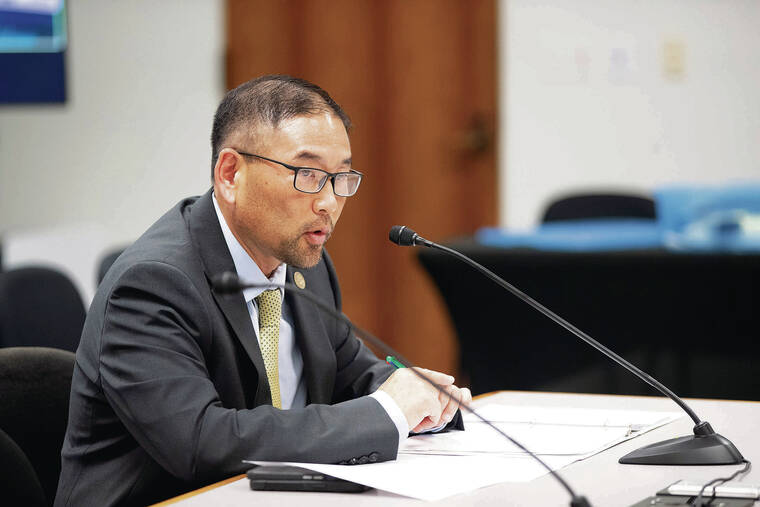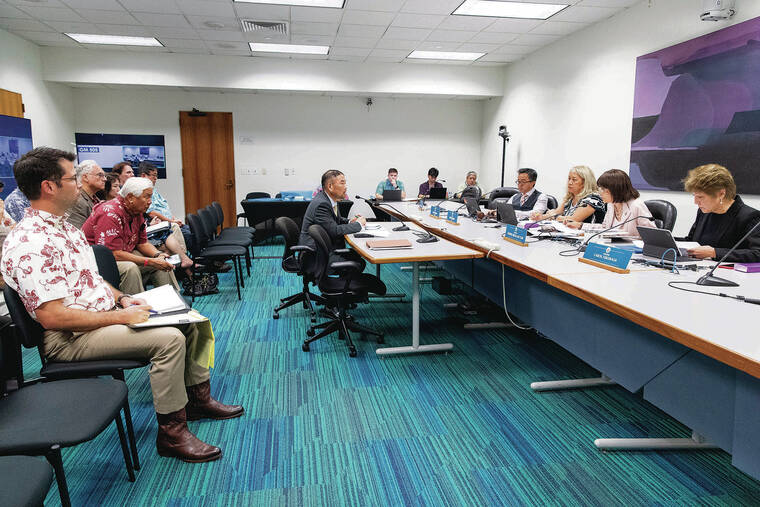Two more of Gov. Josh Green nominees to lead state departments had rough job interviews Thursday by Senate committees, with one receiving a rejection
recommendation.
One Senate committee voted against recommending that Chris Sadayasu head the massive state Department of Business, Economic Development and Tourism and be confirmed by the full Senate, representing Green’s second Cabinet appointee to be voted down after a bruising hearing.
Meanwhile, another committee recommended confirming Kali Watson as director of the state Department of Hawaiian Home Lands after voting down Green’s initial appointment for that position, Ikaika Anderson, in February.
Sadayasu underwent a 90-minute confirmation hearing that drew universal support from some other Green nominees and representatives of some of the 10 agencies that report to DBEDT.
But he faced hard questions from most of the members of the Senate Committee on Energy, Economic Development and Tourism, which voted 4-1 to not recommend that Sadayasu be confirmed.
Only Sen. Carol Fukunaga (D,
Manoa-Tantalus-Makiki) voted to support Sadayasu’s confirmation.
The decision not to recommend Sadayasu’s confirmation was led by committee Chair Lynn DeCoite (D, Upcountry Maui-Molokai-Lanai), who criticized Sadayasu’s “mishonesty” regarding communication.
She was joined by Sen. Donna Mercado Kim (D, Kalihi-Fort Shafter-Red Hill), who questioned his “experience” and “sound judgment,” and Sen. Glenn Wakai (D, Kalihi-Salt Lake-Pearl Harbor), Senate majority leader, and Sen. Kurt Fevella (R, Ewa Beach-Ocean Pointe-Iroquois Point).
In a statement, DeCoite said, “Although I believe Chris is a decent person, his performances during several Senate committee hearings have left me with doubts about his ability to effectively lead this department. Due to the lack of confidence I felt in his potential to effectively manage and collaborate with the agencies that would fall under his direction, I could not support or recommend that we move forward with this nomination.”
DBEDT has administrative oversight of several critical agencies including the Hawaii Tourism Authority, Stadium Authority, state Energy Office and the Hawaii Technology Development Corp.
Sadayasu’s hearing got off to a rough start when Fevella questioned his commitment after missing the December HTA board meeting and left the January meeting before it ended.
Sadayasu told Fevella that the December meeting coincided with the funeral for his father-in-law and that he left the January meeting, with the permission of HTA leadership, because he also had to attend a Stadium Authority meeting, followed by a meeting at the Office of Planning.
His staff continued to monitor the HTA meeting, Sadayasu said.
He also told Fevella that HTA and the Stadium Authority meetings occur simultaneously but promised, “I will commit to you that I will attend as many meetings as possible.”
Fevella then left to attend the confirmation hearing
for Watson and returned before it ended to vote against Sadayasu without hearing any of the other senators’ questions or Sadayasu’s
responses.
Kim pounded Sadayasu for his “bold move” for issuing a request for proposal to oversee tourism marketing to North America without consulting the HTA board.
Sadayasu, an attorney,
responded that the state Sunshine Law prevented him from consulting with board members because the issue was on the board’s next agenda — and that the state Attorney General’s Office said issuing the RFP was allowed.
Kim repeatedly disagreed and, at one point, told Sadayasu, “Maybe you need some homework on that.”
Sadayasu — as is customary of witnesses — repeatedly told the committee members, “Thank you for that question, senator.”
Kim, clearly frustrated with Sadayasu, asked him to stop thanking her, saying “We’re under a time limit.”
As Sadayasu’s hearing ended, the Senate Hawaiian Affairs Committee was an hour into a 4-1/2-hour hearing to consider Watson to lead DHHL.
The committee voted 4-1 to recommend confirmation by the full Senate, with Fevella registering the only negative vote.
Fevella on Wednesday announced his position on Watson’s nomination over concerns that Watson, who led DHHL from 1995 to 1998 and later became a nonprofit real estate developer with some projects on DHHL land, had only recently paid $136,000 that DHHL said was delinquent for a 5-acre industrial park property in Kalaeloa.
Watson said the sum was unfairly imposed retroactively by DHHL and was being disputed by the nonprofit he founded, the Hawaiian Community Development Board. However, Watson paid the disputed sum so as not to have the issue pending potentially as DHHL’s next leader.
Watson told the committee that were he not nominated for the position, he probably would still be contesting the payment demand.
Some committee members and several people who testified at the hearing raised the issue of potential conflicts of interest for Watson. He said that if confirmed to lead DHHL, he would resign from the nonprofit, where he has no equity interest but receives a salary as president and CEO.
Watson also said that he would recuse himself from any actions involving the nonprofit. Hawaiian Community Development developed and manages Nanakuli Village Center on DHHL land, is working to convert DHHL’s dilapidated 40-unit Ulu Ke Kukui homeless transitional housing project into low-income rental housing and is pursuing other affordable-housing projects.
About 30 people submitted written testimony against Watson’s confirmation. About 70 expressed support in writing, including Green, several other state department leaders, former DHHL Director Ray Soon and three members of the Hawaiian Homes Commission overseeing DHHL.
Kapua Keliikoa-Kamai told committee members that she supports Watson but with reservations, and suggested that more time be spent assessing the conflict issue before a full Senate vote.
“He can do the job,” she said. “He’s done the job.”
Many Watson supporters said his private-sector experience developing affordable housing will benefit the agency, which received a $600 million appropriation from the Legislature in 2022 to help reduce a waitlist of roughly 28,700 applicants seeking homesteads.
“This is one kanaka putting Hawaiians in homes,” De Mont Kalai Manaole told the committee.
Under DHHL’s homestead program, beneficiaries must be at least 50% Hawaiian to receive 99-year land leases for $1 a year, and they must pay for or build their own houses.
The agency has a plan approved in 2022 by the Hawaiian Homes Commission to use about $540 million of the historic $600 million appropriation to create about 3,000 homestead lots for beneficiaries.
Watson said he intends to operate within the parameters of the plan while seeking other financing sources to expand the number of beneficiaries served with projects including condominiums and rent-to-own homes.
Committee members voting for Watson were Sens. Maile Shimabukuro (D, Nanakuli-Waianae-Makaha), who is chair, Jarrett Keohokalole (D, Kaneohe-Kailua), Les Ihara Jr. (D, Palolo-Kaimuki-Moiliili), who voted with reservations, and Herbert “Tim” Richards III (D, North Hilo-Waimea-North Kona).
On Feb. 14, Anderson suffered a 4-1 vote against his nomination and was faulted largely for earlier interactions at two Senate budget briefings and a couple of Hawaiian Homes Commission meetings, shortly after starting the job Jan. 3 as director designate.
Some committee members felt Anderson was not prepared despite having staff available, and for stating that he intended to deviate from DHHL’s approved plan to spend the $600 million within a three-year deadline imposed by the Legislature.
Anderson, a former
Honolulu City Council chair who unsuccessfully ran in 2022 for lieutenant governor, will stay on the job until the Senate makes a confirmation or until the legislative session ends if the latter happens first.






